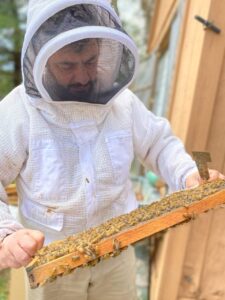(WASHINGTON) — When he was 12 years old, the harmony of a honeybee colony captured Martin Posse’s imagination.
Each bee in a hive performs its part of an intricate dance; some bees forage for nectar while others help raise the young. Another group defends the queen or builds the hive. A queen bee lays eggs to grow the colony. Every bee plays a role and every role helps the hive. “We don’t see the bee as an individual, we look at the whole hive as an individual,” Posse said.
Growing up in Córdoba, Argentina, Posse attended a high school that specialized in farming and mastered the skills to run a small farm. Of all the animals he studied, the bees intrigued him most. Following graduation, Posse started his own beekeeping operation for three years before moving away to pursue graphic design and software engineering. In 2001, he moved to the United States and settled in Maryland.
“For a very long time I was just an IT engineer,” Posse said. That changed about eight years ago when Posse moved onto a larger plot of land and discovered his neighbor was a beekeeper. “I mentioned I was a beekeeper, and it took me two days to be into bees again,” he said.

Posse cares for his bees while dressed in protective equipment. [Credit: Martin Posse]
“We always have challenges, the whole beekeeping thing is a challenge, a big challenge” Posse explained. “We have problems with availability of food and resources for the bees. We have problems with mites which kill hives like nothing. Managing bees is an amazing thing, but you have to work with the bees to make sure they are healthy and thriving.”
Posse has expanded New Horizons to sell beekeeping equipment and offers a class “Dive into the Hive” where participants can see the inside of a bee colony and learn about its social structure.
Most of New Horizons’ sales come from weekly farmers’ markets in Washington, D.C., Maryland, and Virginia. Customers may place some orders online and pick up their purchases at the New Horizons farm in Ijamsville, Maryland.
Last year, the COVID-19 pandemic posed a major obstacle for New Horizons, a small business built around word-of-mouth and in-person sales. “We depend on people buying, and if people are not allowed to go out, then we have lost our customers,” Posse said.
During the height of the pandemic, Posse participated in a few local markets that reserved limited space for food producers. “I was lucky enough to get into some markets and sell honey but there were not a lot of people buying, and we sold less like everyone else,” Posse said. Despite some sales, New Horizons, fell short of the $5,000 per month that he needs to remain profitable.
This year Posse estimates the business has recovered about 20% of its revenue.
Beekeeping “is a very expensive business, and the places we sell at also have a very high cost with fees and the cost of production” Posse said. “With all those [costs] added, the margins are very small.”
The comradery among beekeepers is key to reducing some of those costs and lowering the barriers to entering the industry. “We collaborate with other beekeepers. We try to help each other out, and I have been very lucky to have good friends that are into the business and they have facilitated me to use their equipment in many cases,” Posse said. “There is a huge community of beekeepers, and there is a lot of cross-training and support for new beekeepers.”

